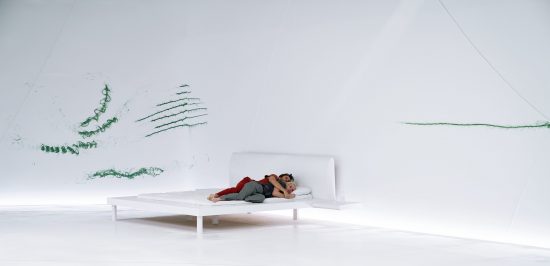Review: The Immaculate Room – “Examines the human condition”

The Immaculate Room sees couple Katherine (Kate Bosworth) and Michael (Emile Hirsch) excitedly walk into a stark white space. It’s a large room, but it’s barren. There’s no television, no phone, no music, no books. Even the ‘food’ that is delivered is an odourless liquid. Besides themselves, their only contact is a voice that, quite often, says, “Enjoy your stay in the immaculate room.” As they enter that room, that’s exactly what Kate and Mike plan on doing. They are welcome to leave at any time, but if they can manage to remain there for 50 days the couple will be awarded five million dollars.
As you can imagine, things start off pretty easily for them. They pass the time with conversation. They nap. Mike runs laps while Kate says self affirmations in the mirror each morning. Their initial enthusiasm starts to wear off as the timer on the wall counts down the days, hours, minutes, and seconds. As one can imagine, staying in a stark white room with nothing for entertainment will put a strain on anyone, and any couple. Mike, an artist who has frivolous dreams of using his winnings to smoke a joint with Elon Musk and Kate, who dreams of investing for the future, are pushed to the brink. And the faceless ‘professor’ who is pulling their strings, is about to pull them even more.
But that’s why we are watching right? To see what eventually unravels this seemingly mismatched couple and if they eventually collect their prize, what consequences they will face. It’s not necessarily charting new waters, but the concept of this film is certainly intriguing and tense. Writer-director Mukunda Michael Dewil (Vehicle 19, Retribution) takes a somewhat straightforward concept and then layers in some more complex challenges for the couple, some of which work, and some of which don’t. The Immaculate Room was, for me, at its best when it stuck to its simple premise without the additions that come later in the film altering the dynamic.
However, Dewil shows restraint in focusing our attention solely on our protagonists. While it would have been fascinating to see more of the world surrounding the Immaculate Room, including more information about its founder, the film is likely stronger for being contained within its walls. And as a director, Dewil deserves credit for seeming to find different angles and new perspectives in which to shoot his leads, despite the stark white nature of the film’s setting. In fact the look and aesthetic of this film is pretty flawless.
Bosworth and Hirsch both turn in great performances acting within this blank canvas. I mean it takes a special something to turn someone reading the label of their shirt collar into an interesting scene, but Hirsch pulls it off. I only wish we had a little more about Mike and Kate as a couple to get the audience more invested in their relationship and up the emotional ante when things between them start getting heated.
I’m a sucker for a story that circles around philosophy and ethics – it’s probably one of a hundred reasons why I love TV’s The Good Place so much – and The Immaculate Room does just that. It examines the human condition, namely what we as people will do when pushed to extremes for reward, big or small. For the first 45 minutes of this film I was enthralled with it, thinking of all the places it could go and what these very different characters would decide. But in the 3rd act, things started to get a little messy. The flow of the film changes and while the unexpected is welcome, it muddies the waters. As things go on, it becomes a psychological thriller that is a little less thrilling, despite some excellent components and performances. It all leads up to a finale that I can only wish was a little more dark and daring.
The Immaculate Room will be released in theatres and on demand August 19th.










